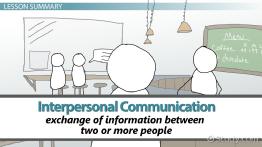Explore Business Communication
Courses and Lessons for Communication in Business
Study.com has hundreds of courses available to help students of any discipline develop business and professional communication skills.
Explore our full library of business communication courses:
Communications 101: Public Speaking
Communications 102: Interpersonal Communication
Business 113: Business Communication
Communications 120: Presentation Skills in the Workplace
Communications 301: Diversity and Intercultural Communication
Explore our full library of business communication courses:
What is Business Communication?
Business communication can be defined as the process of conveying business-related information and its meaning from one person (the sender) to another (the receiver) using at least one means of conveyance and/or media transfer in a professional setting. Most businesses are only able to exist through effective communication, if not from their own resources, then from communication performed by similar entrepreneurs at an earlier date. For instance, effective communication allows the business to function internally, through synergistic relationships between co-workers, management and employees, each of which involves reporting, listening, and responding to information. Similarly, a business' ability to cultivate and retain a customer base depends on its ability to successfully communicate its value to the customer, what makes it better than its competition, and the qualities it associates with its dedicated clients, usually done through advertising. Another example of business communication most people are familiar with is the ubiquitous directive to ''sell yourself'' as a potential employee during an interview, which generally involves highlighting the qualities that make one valuable to a businessperson in order to get hired.
Successful communication promotes many qualities and relationships that aid businesses in many ways:
- Creating and strengthening a feeling of trust between people and organizations
- Opportunities to effect the zeitgeist through trends and fads, perceptions, and discussions
- Building close professional relationships with major communities in the business' given marketplace or area of impact
- Quick problem solving, efficient decision-making, and increased productivity
- Economic gain, greater profitability, and higher return on investment
- Early warning on potential issues likely to affect the business and its clientele




